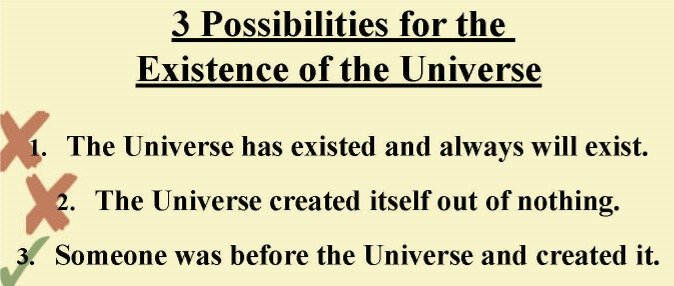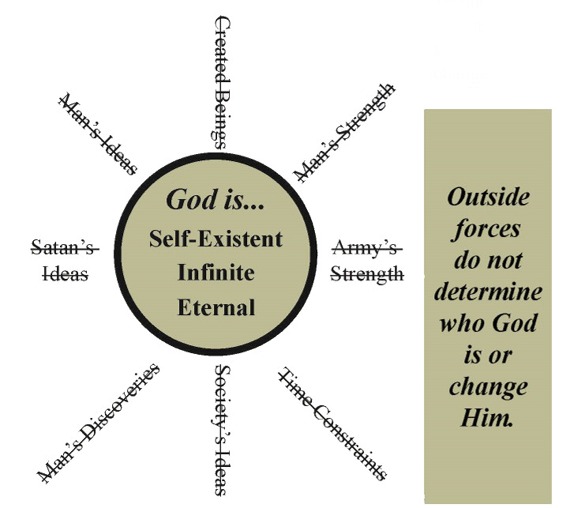Welcome to Lesson 2. After you finish reading the lesson, please scroll down to complete and submit the quiz. Your quiz will be graded by a member of the church who will then email the results to you. Thank you for allowing us to study the Bible with you.
Attributes of God
How would you describe yourself? How would others describe you? It would be hard to do it in just one word. There are so many different characteristics, or attributes, of you that no one could summarize everything in one word. Words like “kind,” “gentle,” “patient,” etc. might describe you or people you know. These are what we would call “attributes” of a person. In this lesson we will look at attributes of God.

The word “God” means the divine nature. When we say “God” we are talking about deity, not humans. However, just like humans, God has attributes as well. We can learn about those by reading God’s communication to man, the Bible.
God has left evidence for His existence through the power and design of Creation. We call that a general revelation.
But even though God has left evidence that He exists, we do not automatically know about God’s attributes just by looking at the Creation. We might see that God is powerful, but is He merciful? Is He loving? What does He expect of me? These questions must be answered by a special revelation. God has delivered that special revelation to man through His word, the Bible. In a future lesson, we will see more about the Bible being communication from God. But for now, let’s use that special revelation to learn more about who God is. In other words, let’s find out more about the words, or attributes, we would use to describe God. Space may not allow us to see all the attributes, but we can still learn some in this lesson.
God is a Spirit
“God is a Spirit: and they that worship him must worship him in spirit and in truth.” (John 4:24) God is not flesh and bones, as you and I are. He is a spirit. “Behold my hands and my feet, that it is I myself: handle me, and see; for a spirit hath not flesh and bones, as ye see me have.” (Luke 24:39) Logically, we understand that God does not have flesh and bones.
- God is a Spirit
- A spirit does not have flesh and bones
- Therefore, God does not have flesh and bones.
God is a spirit. So, anyone who worships a God made of flesh and bones, is worshiping a god which is not really God.
Also, God is not made of silver or gold. A god made of gold, silver, or some piece of rock or stone is not the true God. “Forasmuch then as we are the offspring of God, we ought not to think that the Godhead is like unto gold, or silver, or stone, graven by art and man’s device.” (Acts 17:29)
God, as a spirit, is not contained in one location. There are people today who worship a god confined to one central location. It might be in a temple or their living room. The true God is not confined to one place. Even Solomon’s grand temple could not hold God. “But will God indeed dwell on the earth? behold, the heaven and heaven of heavens cannot contain thee; how much less this house that I have builded?” (1 Kings 8:27)
God is Self-Existent and Eternal
If the universe were eternal we would not have to explain how it got here. We would just say that it has always been here and always will be here. But science shows us the universe is not eternal, and so we have to explain how it started.
The only other two options for the beginning of a universe that is not eternal is that it created itself out of nothing or Someone came before the universe to create it. It is illogical to think that the universe created itself out of nothing, so Someone must have come before it to create it. That Creator we call God.
God is self-existent and eternal. “Before the mountains were brought forth, or ever thou hadst formed the earth and the world, even from everlasting to everlasting, thou art God.” (Psalm 90:2)


God is Omnipotent (All-powerful)
Why would you worship a god who did not have the power to do anything he chose to do. Suppose the god wanted to destroy a certain city because of their wickedness. What if he tried and tried but he simply did not have the power to do it? Would you worship that god? Of course not! If men were powerful enough to stop God, then why would you worship that God?
Our God, the God of the Bible, is all-powerful. “But Jesus beheld them, and said unto them, With men this is impossible; but with God all things are possible.” (Matthew 19:26) Anything that God chooses to do, He may do. There is nothing that can stop Him, outside of contradicting His own nature. There simply is nothing too difficult for God to do. “Behold, I am the LORD, the God of all flesh: is there any thing too hard for me?” (Jeremiah 32:27)
You might hear people talk about how ‘difficult’ miracles must be, but the fact is, they are not difficult to God. They are as simple as drawing a breath, or as speaking. For it was only by the word of His mouth that God created all things out of nothing. “And God said, Let there be light: and there was light.” (Genesis 1:3)
God is Omnipresent (All-present)
There are people on this earth who worship gods that are confined to a certain location. There are places in Asia where they worship the god on the hill, then drive to another location to worship the god of the water.
But the God of the Bible is in all places, at all times. “Whither shall I go from thy Spirit? Or whither shall I flee from thy presence? If I ascend up into heaven, thou art there: If I make my bed in Sheol, behold, thou art there. If I take the wings of the morning, And dwell in the uttermost parts of the sea; Even there shall thy hand lead me, And thy right hand shall hold me.” (Psalm 139:7-10 ASV) Whether in the sky, on the earth, under the water, or even in Sheol (the dwelling place of the dead), God is present. “Can any hide himself in secret places that I shall not see him? saith the LORD. Do not I fill heaven and earth? saith the LORD.” (Jeremiah 23:24)
God is Omniscient (All-knowing)
How would you like to serve a god who does not know answers to questions like, “What is the meaning of life?” or “Why were we created?”
The God that we worship, the one true and living God, knows all things. “Great is our Lord, and of great power: his understanding is infinite.” (Psalm 147:5)
God even knows the ending of something before it begins. He knew that man would sin and need a Savior even before He created him. He is not limited by time or space. When He tells us what to do, it is for our own good, because God can see the end results of our actions, even if we can’t. “Remember the former things of old: for I am God, and there is none else; I am God, and there is none like me, Declaring the end from the beginning, and from ancient times the things that are not yet done, saying, My counsel shall stand, and I will do all my pleasure:” (Isaiah 46:9-10)
God is Just
God is perfect in His ability to deliver blessings to those who obey Him and punishment to those who disobey. Human judges are not perfect and sometimes people suffer unfairly because of them. It is not so with God. He is all-knowing and will always deal fairly with men. “He is the Rock, his work is perfect: for all his ways are judgment: a God of truth and without iniquity, just and right is he.” (Deuteronomy 32:4) “That be far from thee to do after this manner, to slay the righteous with the wicked: and that the righteous should be as the wicked, that be far from thee: Shall not the Judge of all the earth do right?” (Genesis 18:25) “The soul that sinneth, it shall die. The son shall not bear the iniquity of the father, neither shall the father bear the iniquity of the son: the righteousness of the righteous shall be upon him, and the wickedness of the wicked shall be upon him.” (Ezekiel 18:20)
Since God is just and fair, He will also never ask us to do something that is impossible for us to do and then condemn us for not doing it. If He gives us a command, it’s possible!
God is Holy
“There is none holy as the LORD: for there is none beside thee: neither is there any rock like our God.” (1 Samuel 2:2) The idea of holy is the idea of being morally blameless. In other words, God is right and always does what is right.
Since God created the universe, He gets to create the rules for that universe. If something is good, it is because God approves of it. If something is evil, it is because God does not approve of it.
Some try to dismiss the idea of God because there is so much evil in the world. Their argument is that if there is a God, then He would stop or prevent all the evil and suffering in the world. But how do you determine something is evil without God to declare it as evil? If there is no God, then the universe is an accident and what you call “evil” is really just “evil” because you don’t like it. The murderer may murder and think it is a good thing to do, but you may look at murder and call it “evil.” With no God to be the holy and just judge, then who’s to say who is right? If the universe is an accident, then there is no purpose to what we do, when we are dead nothing will have mattered anyway, and I will never answer to anyone after my life is over. So, with no God, whether or not I murder doesn’t matter and cannot be declared “good” or “evil.” The truth is, you cannot declare something as “good” or “evil” unless it is backed up by God also declaring it good or evil. Just because you think it is “evil” doesn’t make it so. God is the source of all goodness and the one who determines what is good or evil.
God is Faithful
Since God is holy, He never does anything wrong. That includes telling lies. “In hope of eternal life, which God, that cannot lie, promised before the world began;” (Titus 1:2)
When God says something, it is true. When God promises something, He will be faithful to keep that promise. That is true whether He promises blessings to those that obey Him, or punishment to those who do not obey Him.
God’s faithfulness is supreme. He must be faithful to His word, or He is no longer holy. Since He is infinite and eternal, He will never stop being faithful to His word. “Know therefore that the LORD thy God, he is God, the faithful God, which keepeth covenant and mercy with them that love him and keep his commandments to a thousand generations;” (Deuteronomy 7:9)
God is Love
“And we have known and believed the love that God hath to us. God is love; and he that dwelleth in love dwelleth in God, and God in him.” (1 John 4:16) “He that loveth not knoweth not God; for God is love.” (1 John 4:8)
A reason there is evil in the world is because God loves us and gave us free choice. He gives us the choice to obey or disobey. He did not make us mindless robots that simply do what He says.
Yet, God also knew that we would choose wrong sometimes. And once we chose to do wrong we would be stained with sin and have to be separated from Him because He is holy. “Behold, the LORD’S hand is not shortened, that it cannot save; neither his ear heavy, that it cannot hear: But your iniquities have separated between you and your God, and your sins have hid his face from you, that he will not hear.” (Isaiah 59:1-2)

But even though we rebelled against God and sinned, He loved us enough to send His Son to Earth and have Him die as a perfect sacrifice to pay the penalty for our sins. God lost a perfect man when man sinned, and Jesus came to Earth as the Son of God to live a perfect life and sacrifice back to God what He had lost, a perfect man. If we accept the sacrifice of Jesus on our behalf, we can be restored to the presence of God.
Jesus did not wait until we were trying to do what is right before He died for us. Man was rebelling against God and against Jesus, and Jesus died for all of us anyway. That is love! “But God commendeth his love toward us, in that, while we were yet sinners, Christ died for us.” (Romans 5:8) “Greater love hath no man than this, that a man lay down his life for his friends.” (John 15:13)
The Consistency of God
God Is Immutable
Another attribute of God is that He is immutable. When something is immutable, it means it does not change. “For I am the LORD, I change not; therefore ye sons of Jacob are not consumed.” (Malachi 3:6) “Of old hast thou laid the foundation of the earth: and the heavens are the work of thy hands. They shall perish, but thou shalt endure: yea, all of them shall wax old like a garment; as a vesture shalt thou change them, and they shall be changed: But thou art the same, and thy years shall have no end.” (Psalm 102:25-27) “Jesus Christ the same yesterday, and to day, and for ever.” (Hebrews 13:8)
We can see that God is immutable when we recognize that He is self-existent, eternal, and infinite. Since He is self-existent, He answers to no Creator. His will does not need to change and certainly does not need to change according to man’s ideas. Since He is infinite, He is all-knowing. He will not change based on something new He learns because He already knows it. Since He is eternal, there is no need to change based on time. Man’s ideas and desires change based on time, but God is eternal and outside of time. Since God is self-existent, no one will make Him change. Since He is infinite, He will not need to change based on knowledge because He is all-knowing. Since He is eternal, He is not under any time constraints. God can and will continue to be who He is and and remain unchanged, forever. “Every good gift and every perfect gift is from above, and cometh down from the Father of lights, with whom is no variableness, neither shadow of turning.” (James 1:17) There is no variableness or changing of God. He is immutable.
This is important to remember when reading the Bible. Some people think that the God of the Old Testament is harsh and unforgiving, but the God of the New Testament is loving and forgiving. Then problems arise because we may start to think that the people of the Old Testament had to follow God strictly or die, but since we live under the New Testament we can just follow God loosely and He will forgive us for not doing things very well. The truth is the God of the Old Testament is the same God of the New Testament. He is immutable and does not change.

- God destroyed people who disobeyed Him in the Old Testament. “And the LORD said, I will destroy man whom I have created from the face of the earth; both man, and beast, and the creeping thing, and the fowls of the air; for it repenteth me that I have made them.” (Genesis 6:7)
- God promises punishment for those who do not obey Him under the New Testament. “And to you who are troubled rest with us, when the Lord Jesus shall be revealed from heaven with his mighty angels, In flaming fire taking vengeance on them that know not God, and that obey not the gospel of our Lord Jesus Christ: Who shall be punished with everlasting destruction from the presence of the Lord, and from the glory of his power;” (2 Thessalonians 1:7-9)
- God loved man in the Old Testament. “Blessed be the LORD thy God, which delighted in thee to set thee on his throne, to be king for the LORD thy God: because thy God loved Israel, to establish them for ever, therefore made he thee king over them, to do judgment and justice.” (2 Chronicles 9:8)
- God loved man in the New Testament. “For God so loved the world, that he gave his only begotten Son, that whosoever believeth in him should not perish, but have everlasting life.” (John 3:16)
All the attributes of God we can see are applicable to God, whether we are looking in the Old Testament or the New Testament. Why? Because we are reading about the same God, and that God is immutable, meaning He does not change!

Since God does not change, His attributes are consistent. God does not stop being just in order to be loving. He does not stop being loving in order to be just. At all times God will be faithful, just, holy, loving, etc.
How can a loving God allow people to go to Hell? Because He was loving enough to give us freewill. We chose to rebel against His commandments and be separated from His holiness. But, He also loved us enough to offer His Son as a perfect sacrifice to save man. Some will use their freewill to accept the sacrifice on their behalf and some will not. Therefore, God will be faithful to His promise of punishment to those who disobey Him, and just to punish those who disobey Him, while blessing those who do obey Him. God is loving, faithful, and just, all at the same time!
We cannot focus on one attribute of God, such as His love, and use that one attribute to dismiss all the other attributes of God. Yes, God is love. But, God is also faithful, holy, and just. He will not tolerate sin in His presence and will not let the wicked go without a penalty being paid. “The LORD is slow to anger, and great in power, and will not at all acquit the wicked: the LORD hath his way in the whirlwind and in the storm, and the clouds are the dust of his feet.” (Nahum 1:3) We must look at all the attributes of God to get a clear picture of who He is. Just as we would not use one word to comprehensively describe a person, so we would not use just one word to comprehensively describe God.
The Trinity
As mentioned before, the word “God” references the divine nature, or the idea of deity. The Law of Excluded Middle tells us that something either is or is not, there is no middle ground. This is true regarding the divine. There is only one divine nature. Someone is either divine or they are not. If someone does possess the attributes of the divine, then we refer to Him as God. Since the word “God” references the divine nature and there is only one divine nature, then we can safely say there is only one God.
The same idea applies to human nature. There is only one human nature. Someone is either human or they are not.
However, there are billions of persons that possess human nature. If we think about the different attributes that humans might possess, we could find billions of people that possess those attributes.
Similarly, there is only one divine nature, but there are three persons who possess it. These three are referred to as “The Trinity.” Since they all possess the attributes of God and they all possess divine nature, we may use the word “God” when referring to the individual persons. You may hear them referred to as:
- God the Father
- God the Son
- God the Holy Spirit
Some people believe stating there is a Trinity is incorrect because they believe the idea of a Trinity is stating there are three gods. However, the confusion comes in if we forget what the word “God” really means. The word “God” refers to the divine nature, not to the persons who possess it. The word “God” does not indicate any number, it merely indicates the attributes of the divine. There is only one divine nature because someone either possesses the attributes of God or they do not. Therefore, there is only one God. There happen to be three persons who possess that nature.
One verse that may be used to indicate there is only one God and deny the Trinity is Deuteronomy 6:4. “Hear, O Israel: The LORD our God is one LORD:” However, this verse actually proves the idea of the Trinity, not denies it. The word translated “one” here is a Hebrew word meaning “united.” The word “one” in this verse does not mean “one” as in “the number between zero and two,” but rather means “one” as in “united.” The interesting thing about the word “united” is that it has no meaning unless you are referring to more than one person. It makes no sense to say “I am united with myself.” But it does make sense to say, “The Father, the Son, and the Holy Spirit are united.” So, this verse is actually stating that the multiple persons of the Godhead are a team and work together because they are united. The same Hebrew word is used in Genesis 2:24 referring to marriage. “Therefore shall a man leave his father and his mother, and shall cleave unto his wife: and they shall be one flesh.” We know that when a man and woman are married they do not literally become one person in number. They are still two persons. But, the Hebrew word again means “united.” A man and woman still remain two persons when they get married, but they become united as a team to work together. Again, the interesting thing about being united is that the word doesn’t make sense unless you have more than one person.

Other places in Scripture show that there are multiple persons of the Godhead, too, including the very first chapter of the Bible. “In the beginning God created the heaven and the earth.” (Genesis 1:1) The Hebrew word translated “God” here is a plural word. There are not multiple “Gods” but there are multiple persons, a plurality, that possess the divine nature (God). “And God said, Let us make man in our image, after our likeness:...” (Genesis 1:26) Notice the plural words “us” and “our.” This would only be possible if one person was talking to at least one more person.
We can also see the Trinity in action at the baptism of Jesus. “Then cometh Jesus from Galilee to Jordan unto John, to be baptized of him. But John forbad him, saying, I have need to be baptized of thee, and comest thou to me? And Jesus answering said unto him, Suffer it to be so now: for thus it becometh us to fulfil all righteousness. Then he suffered him. And Jesus, when he was baptized, went up straightway out of the water: and, lo, the heavens were opened unto him, and he saw the Spirit of God descending like a dove, and lighting upon him: And lo a voice from heaven, saying, This is my beloved Son, in whom I am well pleased.” (Matthew 3:13-17)

Here we see three persons of God in action:
1) God the Father speaks from Heaven.
2) Jesus the Son is being baptized.
3) God the Holy Spirit is descending like a dove.
God’s Attributes in My Life
The Bible’s special revelation reveals more about who God is. We can know more about who God is by reading and studying it.
We can also study to know how God wants us to be. He wants us to add attributes of Him to our own lives to be more like Him.
An easy way to define “godliness” is to just add the letter “k” and make the word “god-like-ness.” God wants us to have godliness and be more like Him. “But godliness with contentment is great gain. For we brought nothing into this world, and it is certain we can carry nothing out. And having food and raiment let us be therewith content. But they that will be rich fall into temptation and a snare, and into many foolish and hurtful lusts, which drown men in destruction and perdition. For the love of money is the root of all evil: which while some coveted after, they have erred from the faith, and pierced themselves through with many sorrows. But thou, O man of God, flee these things; and follow after righteousness, godliness, faith, love, patience, meekness.” (1 Timothy 6:6-11) We are not to pursue things of the world. But, we are to pursue keeping God’s commandments (righteousness), living like God (godliness), belief and trust in God (faith), putting others first (love), consistently doing what is right (patience), and keeping our strength under control (meekness).
We can see how to live with godliness by looking at the example of Jesus. Jesus is God and lived on the Earth as a man to show us what God is like and how to live. “In the beginning was the Word, and the Word was with God, and the Word was God.” (John 1:1) “And the Word was made flesh, and dwelt among us, (and we beheld his glory, the glory as of the only begotten of the Father,) full of grace and truth.” (John 1:14) “No man hath seen God at any time; the only begotten Son, which is in the bosom of the Father, he hath declared him.” (John 1:18)
So, how can we demonstrate the attributes of God but yet live as a man? The answer is to live like Jesus did. “And without controversy great is the mystery of godliness: God was manifest in the flesh, justified in the Spirit, seen of angels, preached unto the Gentiles, believed on in the world, received up into glory.” (1 Timothy 3:16) The mystery of godliness was revealed in Jesus.
NOTE: This lesson was written and developed by Truth for the World and is used here by permission.

Time's up